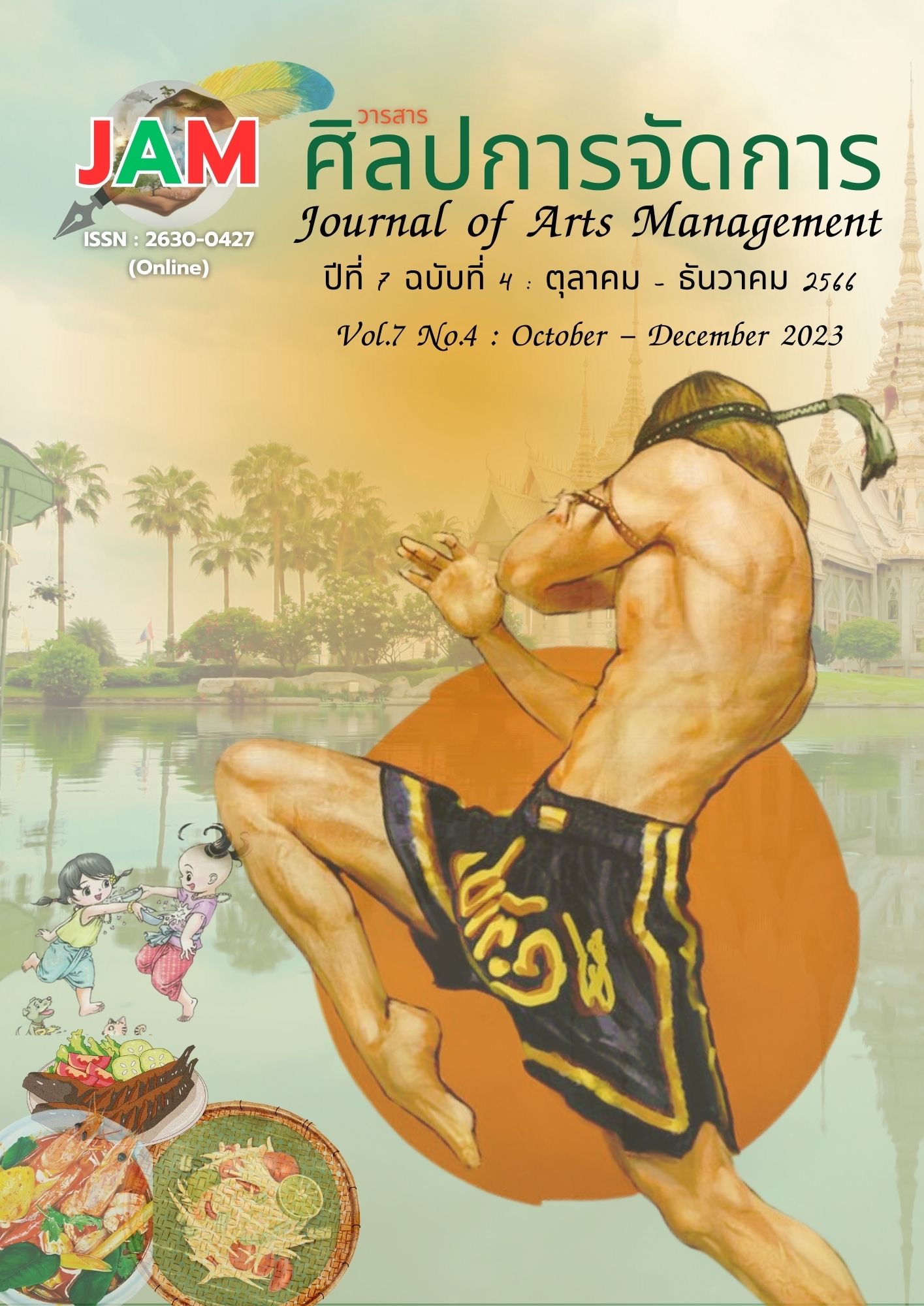The Tourism Plan and Activity Development Connecting with World Heritage City of Kamphaeng Phet Historical Park
Main Article Content
Abstract
This study had two objectives: first, to create a comprehensive tourism plan that would establish meaningful connections between the world heritage city of Kamphaeng Phet and its historic and cultural sites. Second, to develop tourism activities that would seamlessly connect the city with its heritage sites. The research used a qualitative approach and data analysis as its methodology, selecting a sample of 16 tourism stakeholders through purposive sampling. The data collection process involved in-depth, semi-structured interviews and focus group discussions, and content analysis was applied for data interpretation. The research findings highlighted a robust tourism plan for Kamphaeng Phet Historical Park's World Heritage Site, incorporating four key strategies and three operational guidelines. The plan underscores the importance of community involvement, collaboration with relevant agencies, and innovative development to enhance attractions. Moreover, it aims to establish transportation routes that link potential attractions and integrate them with community lifestyles. The emphasis is also on elevating tourism value by fostering creative activities, promoting food tourism, and showcasing local products. The study identified specific tourism activities within the world heritage city of Kamphaeng Phet, including traditional textile dyeing, fabric printing with natural dyes, the creation of sacred emblems of Kamphaeng Phet, a retro market, night-time historical site tours, and visits to archaeological sites in Nakhon Chum and Chakangrao. These activities aim to provide visitors with a rich and immersive experience that encompasses the cultural and historical essence of Kamphaeng Phet.
Article Details

This work is licensed under a Creative Commons Attribution-NonCommercial-NoDerivatives 4.0 International License.
Views and opinions appearing in articles in the Journal of Arts of Management It is the responsibility of the author of the article. and does not constitute the view and responsibility of the editorial team I agree that the article is copyright of the Arts and Management Journal.
References
Boonanont, R. et al. (2008). Tourist Promotion Activities at Kamphaeng Phet Historical Park, The World’s Heritage. The Golden Teak: Humanity and Social Science Journal, 14(1), 24-37. https://so05.tci-thaijo.org/index.php/tgt/article/view/7872
Chanwit. (2021, May 31). World Heritage Site. Office of Natural Resources and Environmental Policy and Planning. https://www.onep.go.th/แหล่งมรดกโลก%2F
Fassin, Y. (2009). The Stakeholder Model Refined. Journal of Business Ethics, 84, 113-135. https://doi.org/10.1007/s10551-008-9677-4
Gilbert, D. U., & Rasche, A. (2008). Opportunities and Problems of Standardized Ethics Initiatives – A Stakeholder Theory Perspective. Journal of Business Ethics, 82(3), 755-773. https://doi.org/10.1007/s10551-007-9591-1
Goni, J. I., & Yustika, B. P. (2019). The Presence of Global Value Chain in Coastal Marine Tourism. Jurnal Riset Manajemen Dan Bisnis (JRMB) Fakultas Ekonomi UNIAT, 4(1), 137-152. https://www.researchgate.net/publication/331486839_THE_PRESENCE_OF_GLOBAL_VALUE_CHAIN_IN_COASTAL_MARINE_TOURISM
Kamphaeng Phet Provincial Industrial Office. (2023, May 27). Kamphaeng Phet Development Plan 2023-2027. Kamphaeng Phet. https://kamphaengphet.industry.go.th/th/kpp
Madera, J. M., Dawson, M., Guchait, P., & Belarmino, A. M. (2017). Strategic Human Resources Management Research in Hospitality and Tourism: A Review of Current Literature and Suggestions for the Future. International Journal of Contemporary Hospitality Management, 29(1), 48-67. https://doi.org/10.1108/IJCHM-02-2016-0051
Miličević, K. (2021). Tourism Value Chain and Sustainability Certification. LABELSCAPE Integration of Sustainability Labels into Mediterranean Tourism Policies. https://sustainablelabels.eu/wp-content/uploads/2021/07/2_Value-chain_K.Milicevic.pdf
Ministry of Tourism and Sport. (2023, January 23). Domestic Tourism Statistics (Classify by Region and Province 2022. https://www.mots.go.th/news/category/657
Ministry of Tourism and Sport. (2023, March 27). National Tourism Development Plan No. 3 (2023-2027). National Tourism Policy Committee. https://secretary.mots.go.th/download/article/article_20230327145011.pdf
Nnadi, M., & Mutyaba, P. E. (2023). The Moderating Effect of Corporate Sustainability Attributes of Products on the Financial Performance of Firms. Science Direct. https://www.sciencedirect.com/topics/social-sciences/stakeholder-theory
Office of the National Economic and Social Development Council. (2020). Regional Development Plan 2017-2022 (Review Edition). https://www.nesdc.go.th/ewt_news.php? nid=8539&filename=index
Patton, M. (1990). Qualitative Evaluation and Research Methods. SAGE Publications, Inc.
Polpraseart, P. (2009). Research Program the Way of Tourism Development and Promotion for a Reflection of Kamphaeng Phet’s Identity. The Golden Teak: Humanity and Social Science Journal, 15(2), 19-35. https://so05.tci-thaijo.org/index.php/tgt/article/view/7950
Richards, G. (2014). Creativity and Tourism in the City. Current Issues in Tourism, 17(2), 119-144. https://doi.org/10.1080/13683500.2013.783794
Sautter, E. T., & Leisen, B. (1999). Managing Stakeholders a Tourism Planning Model. Annals of Tourism Research, 26(2), 312-328. https://doi.org/10.1016/S0160-7383(98)00097-8
Special Area Development Administration Organization for Sustainable Tourism (Public Organization). (2018). Special Area Development Administration Organization for Sustainable Tourism (Public Organization). Book Plus Publishing Company Limited.
UNESCO. (2023). World Heritage List. https://whc.unesco.org/en/list/
World Tourism Organization. (2018). Tourism for Development – Volume I: Key Areas for Action. UNWTO. https://doi.org/10.18111/9789284419722


